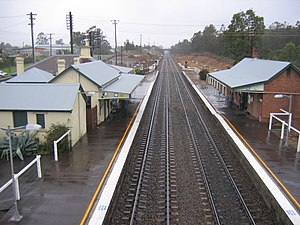Branxton railway station
Branxton | |||||||||||
|---|---|---|---|---|---|---|---|---|---|---|---|
 Station looking east in August 2007 | |||||||||||
| Location | Railway Street, Branxton Australia | ||||||||||
| Coordinates | 32°39′44″S 151°20′44″E / 32.662247°S 151.34562°ECoordinates: 32°39′44″S 151°20′44″E / 32.662247°S 151.34562°E | ||||||||||
| Owned by | Transport Asset Holding Entity | ||||||||||
| Operated by | NSW TrainLink | ||||||||||
| Line(s) | Main Northern | ||||||||||
| Distance | 215.55 kilometres from Central | ||||||||||
| Platforms | 2 side | ||||||||||
| Tracks | 2 | ||||||||||
| Construction | |||||||||||
| Structure type | Ground | ||||||||||
| Other information | |||||||||||
| Station code | BNX | ||||||||||
| Website | Transport for NSW | ||||||||||
| History | |||||||||||
| Opened | 24 March 1862 | ||||||||||
| Passengers | |||||||||||
| 2013 | 10 (daily)[1] (Sydney Trains, NSW TrainLink) | ||||||||||
| Rank | 286 | ||||||||||
| Services | |||||||||||
| |||||||||||
Branxton railway station is a heritage-listed railway station located on the Main Northern line in New South Wales, Australia. It serves the town of Branxton opening on 24 March 1862.[2] It was added to the New South Wales State Heritage Register on 2 April 1999.[3]
A crossing loop previously ran behind Platform 2 but this has now been taken out of use. To the south-west of the station, is a branch to the Hunter Valley Railway Trust's North Rothbury museum.
Platforms & services[]
Branxton has two side platforms. It is serviced by NSW TrainLink Hunter Line services travelling between Newcastle, Muswellbrook and Scone.[4]
| Platform | Line | Stopping pattern | Notes |
| 1 | HUN |
services to Newcastle | [4] |
|---|---|---|---|
| 2 | HUN |
services to Muswellbrook & Scone | [4] |
Description[]
The up platform station building is a brick combination office/residence of type 1 design, originally dating from 1862 with alterations in the 1880s and again in 1915. The down platform station building is a brick island building dating of type 11 design from duplication in 1915. The platform faces were completed in brick with a dock platform.[3]
A timber, skillion roofed signal box with remaining telegraph wires and poles (c. 1915), a timber store, a steel footbridge (c. 1915), the concrete base of a JC Commenson T431 5 ton jib crane, and signs, seats, and fences including examples from different periods of railway development are all included within the heritage listing.[3]
A Pooley 5 ton weighing machine was recorded in the initial heritage listing, but was found to be not existent in 2004. The original double light colour light, metropolitan-style signals from 1946 were replaced c. 2000 with standard colour light signals.[3]
Heritage listing[]
Branxton features some of the earliest buildings on the northern line. The substantial nature of the buildings reflects the importance once attached to the town and its station. The original station incorporated a rare example of a residence (1 of 5 similar structures in the State). The group exhibits the effects of duplication and the addition of structures from later periods including several additions to the 1862 building during the 1880s and again in 1914 to make a substantial main line railway group.[3]
The group is one of the most interesting and important sites surviving in the State.[3]
Branxton railway station was listed on the New South Wales State Heritage Register on 2 April 1999 having satisfied the following criteria.[3]
The place possesses uncommon, rare or endangered aspects of the cultural or natural history of New South Wales.
This item is assessed as historically rare. This item is assessed as scientifically rare. This item is assessed as arch. rare. This item is assessed as socially rare.[3]
References[]
- ^ Bureau of Transport Statistics. "Train Statistics 2014" (PDF). Transport NSW. Retrieved 15 July 2018.
- ^ Branxton Station NSWrail.net
- ^ a b c d e f g h "Branxton Railway Station group and movable relics". New South Wales State Heritage Register. Office of Environment and Heritage. H01098. Retrieved 2 June 2018.
- ^ a b c "Hunter line timetable". Transport for NSW.
Attribution[]
![]() This Wikipedia article contains material from Branxton Railway Station group and movable relics, entry number 01098 in the New South Wales State Heritage Register published by the State of New South Wales and Office of Environment and Heritage 2018 under CC-BY 4.0 licence, accessed on 2 June 2018.
This Wikipedia article contains material from Branxton Railway Station group and movable relics, entry number 01098 in the New South Wales State Heritage Register published by the State of New South Wales and Office of Environment and Heritage 2018 under CC-BY 4.0 licence, accessed on 2 June 2018.
External links[]
 Media related to Branxton railway station at Wikimedia Commons
Media related to Branxton railway station at Wikimedia Commons- Branxton station details Transport for New South Wales
- Railway stations in the Hunter Region
- Railway stations in Australia opened in 1862
- Regional railway stations in New South Wales
- Short-platform railway stations in New South Wales, 2 cars
- New South Wales State Heritage Register
- Singleton Council
- Main North railway line, New South Wales
